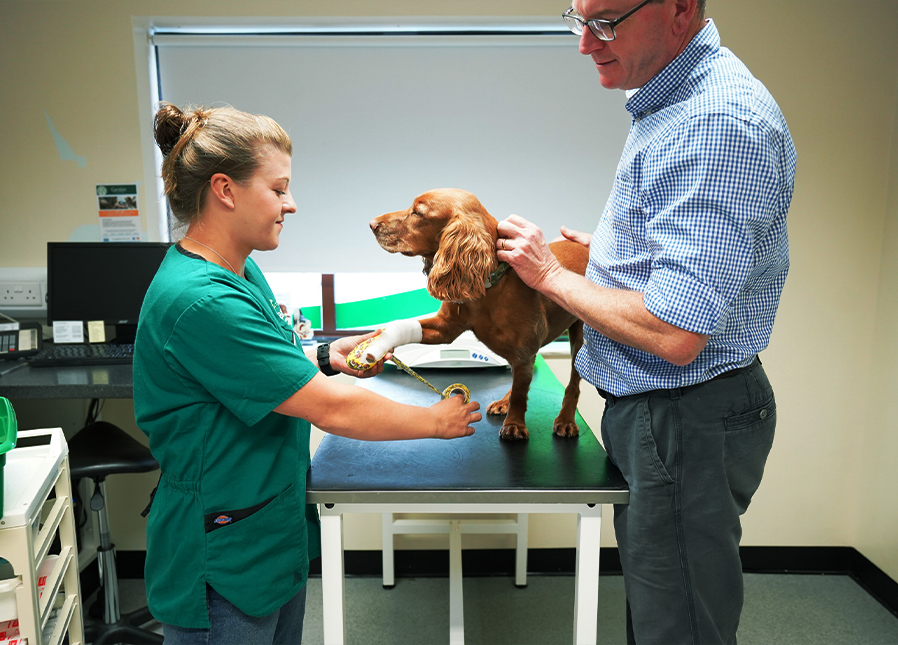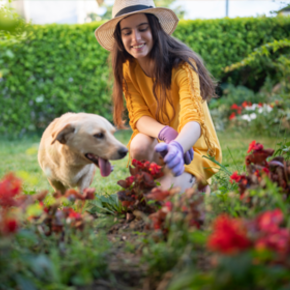
The sun is out, everything is in flower, and everyone has come out of hibernation: gardening season has begun! While this is a lovely time of year to spend with your pet, there are potentially poisonous plants in your garden that will affect cats and dogs. At Garston Vets, we can assist you with pet-proofing your garden by providing a list of common garden plants that are toxic to pets. Read on to learn more about common garden plants you need to look out for and the symptoms of plant poisoning.
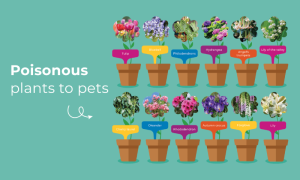
See below for 12 poisonous plants to look out for and the symptoms of poisoning in your cat or dog.
Hydrangea
Signs and symptoms of hydrangea poisoning:
- Vomiting
- Lethargy
- Diarrhoea.
If you suspect your dog has ingested any part of a hydrangea plant, it’s crucial to contact your vet immediately. The earlier treatment is initiated, the better the chances of a full recovery. Early intervention can involve inducing vomiting, administering activated charcoal to absorb toxins, and providing supportive care to manage symptoms and prevent complications.
Lilies
Signs and symptoms of lily poisoning:
- Vomiting
- Not eating.
- Drooling
- Drinking or peeing more
- Twitching, seizures or sudden death
Every part of the lily, including the pollen is very poisonous to cats. Seek veterinary advice immediately if you think your cat has come in contact with this plant. To prevent lily poisoning, it is recommended to remove cut lilies from flower arrangements in the home.
Contact us immediately if you notice any of the above behaviours after your pet has consumed lilies or has lily poisoning.
Lily of the valley
Lily of the valley is one of the most poisonous plants to cats and dogs. The plant’s bulb, roots, stems, leaves, blooms and berries are all poisonous.
Signs and symptoms of lily of the valley plant poisoning
- Diarrhoea
- Vomiting
- Blood in the stool
- Discomfort in the abdomen.
If you think your pet may have eaten any part of the lily of the valley plant, contact your nearest vet immediately.
Autumn Crocus
The autumn crocus is toxic in all parts, but particularly in the bulb, blooms and seeds. Autumn crocus contains tropane alkaloids, which are extremely poisonous to dogs and can cause serious renal issues or even organ failure.
Signs and symptoms of autumn crocus poisoning:
- Burning in the mouth
- Increased salivation
- Thirst
- Difficulty swallowing
- Stomach pain
- Diarrhoea
- Blood in urine or failure to pass urine.
Call us immediately if you believe your pet has swallowed an autumn crocus. Consider removing any of the remaining plant from your home or outdoor areas to prevent further exposure to your pet once your pet has received medical attention.
Oleander
Poisoning Symptoms after Oleander Consumption:
- Diarrhoea
- Elevated heart rate
- Drowsiness
- Seizures or lack of consciousness.
When dogs swallow oleanders, they need to be treated by a vet as soon as possible.
Rhododendron
These gorgeous blooming plants surround many homes; however, it’s very toxic to pets! All parts of the rhododendron plant are toxic for dogs. The rhododendron plant’s leaves are the most harmful, although the flowers and nectar can also be dangerous.
Signs and symptoms of Rhododendron Poisoning
- Gastrointestinal upset
- Weakness
- Paralysis
- Abnormal heart rhythms.
If your pet consumes large doses of this plant, it can be fatal. We advise that you seek veterinary care as soon as possible if you think your pet has consumed this plant.
Angel’s trumpets
Many people own this plant without realising how harmful it is to their pets since it produces beautiful blooms. While most pets are deterred from nibbling on the leaves by their strong odour, some creatures are not.
Signs and symptoms of poisoning include:
- Behavioural changes
- Disorientation
- Dilated pupils
- Hyperthermia
- Loss of appetite
- Change in heart rate
- Change in respiratory rate.
We advise immediate veterinary care if your pet has ingested this plant.
Bluebells
Bluebells are a spring favourite and is a common flower that you may find on woodland walks, in your garden and even on the sides of the road. Bluebells contain a toxin that affects the heart, and are poisonous to dogs.
Signs and symptoms of bluebell poisoning:
- Stomach pain
- Dermatitis and irritation of the skin
- Vomiting
- Diarrhoea
- Drooling
- Trembling
- Lethargy
- Reduced heart rate.
Foxgloves
All parts of the foxgloves plant are poisonous to dogs, cats, and even humans. These toxins, called cardiac glycoside toxins, affect the heart by disrupting its internal balance.
Signs and symptoms of foxglove poisoning:
- Nausea
- Tremors
- Collapse.
If you believe your dog has ingested or chewed a piece of this plant, treat it as a medical emergency and contact your vet as soon as possible. Foxglove poisoning lacks an antidote; thus, supportive therapy becomes the primary treatment approach.
Garden Hazards for Pets
To ensure that your pets don’t try to eat or nibble on your home plants while you’re away, it’s best to keep them out of reach. Additionally, keep an eye on your dog to make sure they haven’t discovered any plants that might endanger them when they’re on walks or in the garden. Keeping them on a lead would make this easier when walking them.
Plants that are Safe for Your Pets
Shrubs
- Black Hawthorn
- Chaparral
- Crimson Bottlebush
- Magnolia Bush
- Mulberry Bush
- Rose.
Trees
- Big shellbark hickory
- Bitter pecan
- Bottle palm
- Carob tree
- Figleaf palm
- Hemlock tree
- Iron tree
- Japanese aralia
- Mockernut hickory
- Mulberry tree
- Pupleosier willow
- Red maple
- Silver bell tree
- Tree cactus
- Tulip poplar.
Flowers
- African violet
- Bromeliads
- Creeping zinnia
- Gerbera daisy
- Lipstick plant
- Petunia
- Phalaenopsis orchid
- Zinnia
Houseplants
- American rubber plant (Common names: pepper face, baby rubber plant)
- Blue echeveria, a succulent (Common names: maroon chenille, painted lady, copper rose, wax rosette, plush plant, “hen and chicks”)
- Boston fern
- Cast iron plant
- Christmas cactus
- Donkey’s tail, a succulent
- Parlor palm
- Spider plant
- Swedish ivy.
Learn more about other dangers for your pet, with our blogs about chocolate poisoning here and our post on the dangers of conkers here for more information on things to keep out of your pet’s reach!
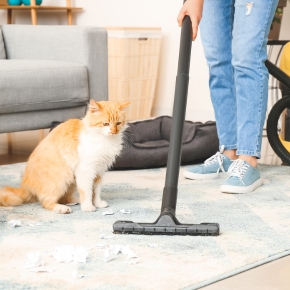
As the vibrant colours of spring begin to bloom in Wiltshire and Somerset, many pet owners turn their attention to spring cleaning. While decluttering and freshening up your living space can be invigorating, it’s essential to be mindful of potential hazards for our feline friends.
Cats are naturally curious creatures, and as you embark on your spring-cleaning journey, it’s crucial to create a safe environment for your four-legged family members. In this article, we’ll explore some common indoor hazards and learn how to ensure your curious cat stays happy and healthy with tips from the veterinary team at Garston Vets.
Contact us with your cat concerns
Cat safety tips for a thorough spring clean
Know which cleaning products are toxic to cats
Spring cleaning often involves an array of cleaning products, many of which can be toxic to cats. Household cleaners, bleach, and disinfectants may contain chemicals that can be harmful if ingested or if they come into contact with your cat’s skin. As a general rule of thumb, any products with a hazard warning on aren’t safe for cats. When using these products, ensure proper ventilation, and keep your feline friend in a separate, well-ventilated area until surfaces are dry. Our vets in Wiltshire and Somerset recommend that cat owners consider using pet-safe cleaning alternatives or thoroughly rinsing and drying surfaces afterwards.
Can you recommend any pet-safe cleaning products? Help other Wiltshire and Somerset cat owners and share them on our Facebook page.
Keep cats safe by windows & balconies
With the arrival of warmer weather in Wiltshire and Somerset and when you’re using chemicals to clean, you’ll probably want to open windows and let the fresh air in. However, open windows and balconies can pose a danger to cats, especially those with a penchant for exploring. Ensure that any external openings aren’t big enough for your cat to get out of, or they are securely screened to prevent accidental falls or escapes. You may want to create a cozy spot in the room you’ll be tackling last to keep them away from cleaning chemicals and smells.
Manage loose cords and string
Spring cleaning often involves reorganising and tidying up, which can lead to the discovery of loose cords and strings. Cats are notorious for playing with anything that dangles, but these items can pose a choking hazard if ingested or they could get tangled in them. Top tips from the team at Garston Vets are:
- Secure loose cords or tuck them away to prevent your cat from playing with them.
- Provide safe alternatives, such as interactive toys, to keep your cat entertained & engaged.
Check hidden spaces
Cats love to explore nooks and crannies, especially when there’s a change in their environment. During spring cleaning, be mindful of potential hiding spots that may become accessible. Check behind furniture, inside cabinets, and under appliances to ensure your cat can’t access tight spaces where they may get stuck or find hazardous materials.
Beware of springtime flowers & plants that are poisonous to cats
When the spring clean is over, you might want to add a touch of nature to your home with some springtime flowers or plants. Beware though, some plants are toxic to cats. Lilies, daffodils, azaleas, and tulips are just a few examples of plants that can be harmful when ingested. The advice from our veterinary team in Wiltshire and Somerset is that you should research the plants in your home and remove any that pose a risk to your cat. You could just opt for pet-friendly flowers like catnip or spider plants instead to brighten up your space without compromising your cat’s safety.
Why not share your favourite cat-friendly plants & flowers on our Facebook page to help other cat owners in Wiltshire and Somerset?
Spring cleaning is an excellent opportunity to refresh your living space, but it’s essential to prioritise your cat’s safety throughout the process. By being mindful of potential hazards such as toxic cleaning products, open windows, loose cords, hidden spaces and harmful plants, you can create a safe and comfortable environment for your curious feline companion.
In an emergency, call us on 01373 452225 right away, or if you have any questions about our article, view all our contact details here.
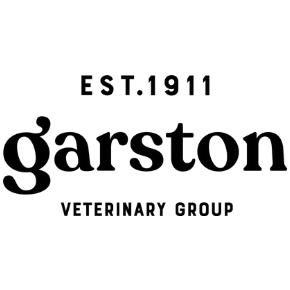
Seasonal surgery opening hoursChristmas Eve 24th December – Emergency team Christmas Day 25th December – Emergency team Boxing Day 26th December – Emergency team Wednesday 27th December – Normal opening hours Thursday 28th December – Normal opening hours Friday 29th December – Normal opening hours Saturday 30th December – Normal opening hours New Year’s Eve 31st December – Emergency team New Year’s Day 1st January – Emergency team Tuesday 2nd January – Normal opening hours Please remember to place food and repeat prescription orders by Wednesday 20th December 2023 Emergency CareAs a client of Garston Vets, you can feel confident that we are always available to deal with any pet emergency that may arise, day or night, including Christmas Day, Boxing Day and New Year’s Day. We are one of the few practices in Somerset & Wiltshire that operate our own out of hours emergency service on-site at our accredited small animal hospital at Garston House in Frome. Our hospital is staffed 24 hours a day, 7 days a week, looking after sick and injured patients or those requiring post-operative observational care – your pets are never left alone. It is the same cohesive team of vets and nurses that look after your animals out-of-hours as you will meet during the day at any of our practices. Our computerised patient records from all our surgeries are securely linked via internet servers, so we have access to all your pets’ clinical records whatever time of the day. If you have a pet emergency, please call us on 01373 452225 |
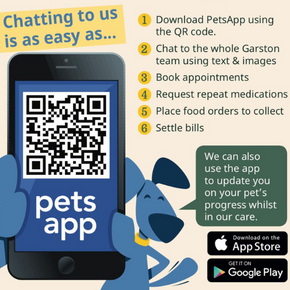
Chatting to our small animal team, booking appointments, requesting repeat medication and food orders, plus settling bills and keeping up to date with your pet’s progress while staying with us has just got a great deal easier.
PetsApp is our new online service that is keeping our phone lines free for more urgent calls. If you haven’t downloaded PetsApp already, you can do so:
By responding to our SMS invitations,
or
By clicking on the magic link https://petsapp.com/ml/ubgjLa2c2n9i3BEi9, selecting your usual Garston surgery, and creating your pet’s profile,
or
By using the PetsApp chat tab on our website in the bottom right-hand corner of our homepage.
Once you have a PetsApp account the whole family can use the same log-in to contact us about your pet.
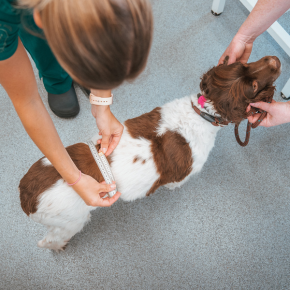
Obesity is one of the most common nutritional disorders in our pets today. Approximately 6 in 10 cats and dogs are overweight.
Just as in humans, weight gain most commonly occurs when there is an excess calorie intake that does not match the animal’s level of physical activity. Many things can contribute to weight gain including age, mobility, food type, and neuter status. It is important to recognise that although these factors increase the risk of weight gain, it is avoidable as long as we are aware of the presence of these risks.
What are the risks to my pet if they are overweight?
Animals who are overweight have a reduced life-expectancy and will have an increased risk of the following conditions:
- Arthritis
- Diabetes mellitus
- Heart disease
- High blood pressure
- Breathing difficulties and snoring
- Heat stress
- Pancreatitis
Many other significant conditions can be exacerbated by excess body weight, and animals that are overweight will have a significantly increased anaesthetic risk no matter what surgery they require.
How do I know if my pet is overweight?
Hopefully you will have already made you initial free weight clinic appointment with one of our nursing team. If you haven’t please do so as soon as possible. We have lots of experience with weight management are are here to give you as much advice and support as possible.
What can I do to prepare for the appointment?
- With the aid of our nurses we hope that you will soon start to see visible signs of weight loss in your pet. To do this we to start off on the correct foot. Please follow the next few steps so that your first appointment is effective as possible.
- Talk to all family members and other carers of your pet. You need to explain to them for health reasons your pet will begin a weight loss program. If everyone is on board at the start it should avoid frustration and confusion.
- Please complete a food diary for your pet for at least one week. Absolutely everything needs recording, from their normal daily meal, to every last table scrap or treat that they get given. Please be as honest as possible, as having a completely accurate record makes it easier for our Nurses to formulate a diet plan for your pet. Ensure you bring this with you to your appointment.
- Please either provide photos or bring your pet’s food packaging in with you to the appointment. Every food is formulated differently and the information on the back of the packet provides us with the nutritional information we need to devise a correct feed guide for your pet.
What happens at the initial consultation?
We do ask that you bring your pet along to all weight clinics.
During the free initial weight clinic:
- Your pet will be weighed and have various body measurements taken and recorded.
- The nurse will take several photographs of your dog for the records.
- The nurse will then spend time discussing your pet’s food diary and daily exercise regime with you.
- We will then discuss with you various options regarding diet and treats to allow us to tailor an individual and realistic diet and exercise plan for your pet.
- We will also provide your pet with their own weight management booklet to help support you through their weight loss experience.
At the end of the consultation our aim is to have helped you formulate a plan for your pets weight loss, diet changes, and exercise regime, we will also arrange an appointment for your pets next check.
We are offering 25% off all Royal Canin Weight Management Satiety diets in July, with a further 20% off for Wellness Plan members. Please click here or speak to a member of a team to find out more about our Weight Management Clinics and offers.

The Garston Vets’ Wellness Plans are designed to provide all your pet’s preventative healthcare needs for twelve months at a time. Each membership allows you to spread the cost of your pet’s annual preventative healthcare needs into twelve affordable monthly payments, as well as make further savings in other areas.
Our NEW Premium Wellness Plan includes UNLIMITED VETERINARY CONSULTATIONS and DISCOUNTED OUT OF HOURS FEES, giving dog and cat owners ultimate peace of mind.
All our Wellness Plans have been specifically designed so that your pet can receive bespoke preventative healthcare all year round with the cost to you spread over monthly payments. The plans incorporate annual vaccinations, anti-parasite medications, and a whole range of additional inclusions & savings to allow your pet to remain in tip-top shape.
Our team will work with you to ensure every aspect of your pet’s healthcare is appropriate and tailored to their age & lifestyle.
At Garston Vets we know our Wellness Plans provide exceptional cover as they also include tick prevention – an ever-increasing problem in rural areas. To budget with confidence whilst providing optimal veterinary care for your pet, sign up to our 12-month payment plan and start enjoying the many benefits right away.
Join or upgrade your existing Wellness Plan membership today!
Please note, our Wellness Plan options are not a pet insurance policy. We would recommend that you also consider insuring your pet against accident and illness.
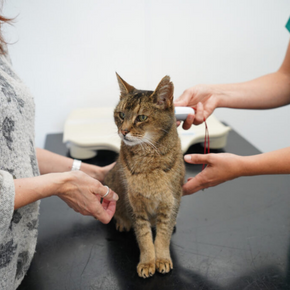
Our pets age more quickly than us and are generally classed as senior around the age of 7. The ageing process unfortunately comes with an increased occurrence of mobility issues, sensory loss, a degeneration in cognitive function and other age-related diseases.
Once our pets reach their elder years routine check-ups become more critical as your veterinary team will be able to detect subtle changes in your pet and be able to treat them before they become too serious.
We are now delighted to be offering our Senior Clinics, led by our Registered Veterinary Consult Nurses, which are recommended ahead of your pet’s annual booster so that the results can then be discussed with the vet during their annual health check. The clinics are designed not to find issues with your senior pet, but to allow us to assess, evaluate and improve the quality of our patient’s lives. All results will be recorded all your pet’s health records, which allows us to monitor their overall health and wellbeing through to their geriatric years. To allow our team to monitor and support our patients’ senior years, we recommend a routine visit to our Senior Clinic annually.
These clinics will initially be offered at an introductory price of £39.00 (normal price £45.50) for a 60-minute consultation.
Why not take a look at our questionnaire to see if your pet would benefit from a Senior Clinic Consultation?
If any of the questions that we have asked in the survey have been answered with a yes, then we would recommend booking a Senior Clinic for your pet.
What to expect from my Senior Clinic Appointment
Your senior clinic will be scheduled before your pet’s annual booster appointment. Before attending the senior clinic, you will be sent a copy of the questionnaire to complete honestly about your pet, you will also be asked to bring a fresh urine sample with you.
During the 1-hour appointment, the Nurse will perform a head to tail check of your pet checking eyes, ears teeth, skin and coat, recording any lumps found or changes to existing lumps. Checking claws/nails and clip if required, also expressing anal glands if needed. The nurse will also record vital signs such as heart rate, respiratory rate and blood pressure, which can only be done using a special piece of equipment. We will also discuss the completed questionnaire with you and chat about any small changes that you may have noticed in your pet’s behaviour as they have got older.
All of the findings, along with the urine results will be recorded before seeing the vet at the annual booster appointment, where appropriate treatment will be advised if required.

Senior Clinic Launch |
We were very excited to launch our NEW Senior Clinic launch night on Wednesday 1st February at The View, Westbury. Just under 100 clients attended the evening, with Garston staff presentations on dentistry, arthritis and cognitive dysfunction.
We are now delighted to be offering our Senior Clinics, led by our Registered Veterinary Consult Nurses, which are recommended ahead of your pet’s annual booster so that the results can then be discussed with the vet during their annual health check. The clinics are designed not to find issues with your senior pet, but to allow us to assess, evaluate and improve the quality of our patient’s lives. All results will be recorded all your pet’s health records, which allows us to monitor their overall health and wellbeing through to their geriatric years. To allow our team to monitor and support our patients’ senior years, we recommend a routine visit to our Senior Clinic annually.
These clinics will initially be offered at an introductory price of £39.00 (normal price £45.50) for a 60-minute consultation.
If any of the questions that we have asked in the survey have been answered with a yes, then we would recommend booking a Senior Clinic Consultation for your pet.
Book a senior clinic appointment now by calling your local surgery or contacting us on PetsApp.
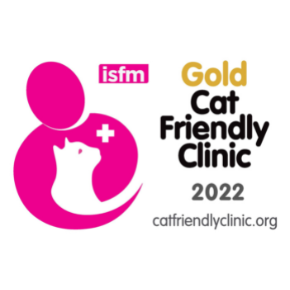
We have recently celebrated our further commitment to cat welfare by achieving the higher level of gold accreditation under the ISFM Cat Friendly Clinic accreditation programme at our small animal hospital in Frome.
Cat Friendly Clinic is a programme run by the International Society of Feline Medicine (the veterinary division of International Cat Care) to encourage veterinary clinics to adopt more ‘cat friendly’ approaches to reduce the stress and difficulties of veterinary visits for cats. It aims to promote well-being and high standards of care for all cats visiting or being hospitalised in a veterinary clinic. Under the programme, a clinic has to prove rigorous adherence to a set of criteria which includes provision of facilities and demonstration of staff activities and attitudes aimed at reducing stress in cats, both as in-patients and out-patients. The criteria includes having separate dog and cat waiting areas, feline-friendly hospitalisation cages, and veterinary equipment specifically for treating cats. Most importantly, staff are encouraged to approach and handle cats sensitively and respectfully. Clinics are expected to maintain high standards of veterinary care, including continuing to update their knowledge of feline medicine as new knowledge becomes available.
Natalie Gowen the clinic’s Cat Advocate is proud of the clinic’s further achievement: “Cat Friendly Clinic accreditation at this further level means we’ve committed to delivering even higher standards of feline care, with compassion and expertise. Our cat facilities are specifically geared towards the reduction of stress and all our staff are trained in gentle handling techniques. Our Frome surgery is currently undergoing major building work, to create more consulting rooms another operating theatre and separate cat and dog waiting areas. We can also give advice to owners on how to reduce anxiety when giving medication or treatments at home. Through our accreditation, we want to show cat owners that routine preventive care, and a prompt visit if their cat seems unwell, will help to give it a longer, healthier and happier life.”
Cat-friendly appointments
Most cats are very happy in our spacious waiting rooms, however, to support nervous cats we offer designated cat-friendly appointment times at all our surgeries, on the following days of the week:
- Frome Vets – Tuesdays
- Melksham Vets – Thursdays
- Trowbridge Vets – Wednesdays
- Warminster Vets – Wednesdays
- Westbury Vets – Thursdays
Our cat-only appointment times include veterinary consultations and nurse appointments, and keeping our waiting areas dog-free reduces potential stresses for cats and owners (Note: if we do have any dog emergency cases during these times, we will let you know on arrival). Visit our team page to see which staff members are specially trained Cat Advocates too!
Cat owners can find out more about International Cat Care and the Cat Friendly Clinic initiative at www.catfriendlyclinic.org.
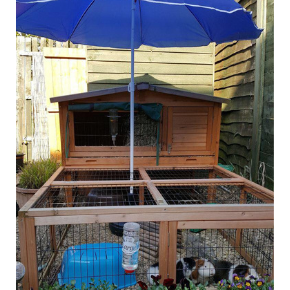
Even though they are small animals, the risk that hot temperatures pose to rabbits, guinea pigs, and hamsters is big. In fact, for most small pets, their ideal temperature range tops-out at 23-25°C and anything above can quickly become life-threatening. Some bunnies can tolerate temperatures as high as 30°C but it’s a risk not worth taking.
As rabbits, guinea pigs, and hamsters cannot sweat like humans do, and have limited options to cool themselves down, it’s up to their owners to help them survive summer heatwaves.
If you have questions after reading our article or concerns about your pet’s health, get in touch with our team.
Symptoms of heatstroke in small furry pets
If your rabbit, guinea pig, or hamster starts to exhibit any of the following symptoms of heatstroke you should get them somewhere cool and call us on 01373 452225 for emergency advice.
- Shallow, accelerated breathing (panting)
- Excessive drooling (thick saliva)
- Hot ears
- Wet nose
- Bright red or blue tongue and gums
- Less urine output due to dehydration
- Lethargy and weakness
- Confusion
- Convulsions
- Cardiac arrest
How to help small furries cope in summer
When the mercury is rising, there are some steps you should take to make sure your small furry pets stay safe. Our team of experienced vets have the following advice:
- Rabbits regulate their temperature through their ears so one way to boost their natural cooling system is to spray their ears with water – it will evaporate as it warms up. Avoid soaking your bunnies as this could put them at risk of respiratory illnesses.
- During hot weather, move their hutch or cage out of direct sunlight and into the coolest spot that is practical.
- Keep water bottles and bowls topped up and if there is access to power nearby, think about setting up a fan (not pointed directly at the cage) to keep the air moving.
- Make a ‘cold water bottle’ and wrap it in a cloth for your pets to lounge against or set up frozen water bottles around their housing.
- Place a cooling mat or pop some cold tiles in the cage or hutch for your pets to lie on.
- Rabbits and guinea pigs can be more prone to flystrike in warm weather so make sure your pets are clean and dry (check for urine stains) and keep their bedding and housing impeccably clean.
All these little tricks should ensure your small furry pets do not succumb to the heat. Remember, our vets are here to help if you are concerned about your pet’s health.


